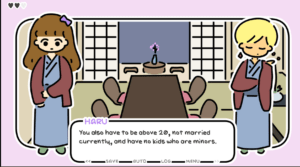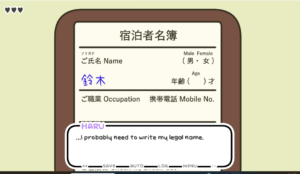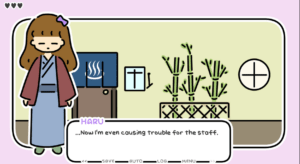This week I played One Night, Hot Springs on Steam, an online video game created by npckc and playable by people of all ages.
This game clearly intertwines the feminist theories discussed in the book”Play Like a Feminist” by Shira Chess, not only by being different from the traditional action-heavy format of many existing games, carrying the fun of the game instead through narrative and “cute” graphics, but also through the storyline that it showcases in the game which revolves around a transgender, Japanese character, representing an identity that not only diverges from the “traditional” heterosexual, male viewpoint of current games but also represents a more intersectional view of feminism by showing us a story that is not based in Western society. When I first opened the game, I was a bit confused about what it would end up entailing. There was no clear sign of a storyline or goal within the game, but I was drawn in by its non-traditional (in the view of the Western games that I am used to seeing and playing) aesthetic which was very cute, feminine, and cartoon-like. However, immediately after you begin to understand the mechanics of the game which revolve around pressing the spacebar to trigger a scene/dialog in a narrative and occasionally choosing between two options of what the main character Haru should do or say to others (what you choose affects the narrative), you begin to get hints at the premise of the game — to narrate the experiences of a transgender woman. One Night, Hot Springs combines an emergent and embedded narrative type as players control the storyline of the game by choosing what risks the main character takes on her best friend’s birthday trip to a hot spring, a setting that makes her nervous because of her identity. While I was playing the game, I tried to make choices that would encourage Haru to go out of her comfort zone and allow her to experience the same excitement that her friends were able to experience at the Hot Springs. As I did this, I was taken through a journey of all of Haru’s emotions, thoughts, and deliberations, from worries about being a bother to her friends or the hot springs staff, to being excited about being upgraded to a room where she could privately go into one of the baths, to feeling forced to have difficult conversations about her identity with other people. By getting to play as Haru and getting to experience a mix of being both a spectator to her emotions and an active decision-maker in what she did, I built up a strong sense of rapport with the character and felt like I was able to learn more about the experiences of transgender individuals, being exposed to difficult decisions and uncomfortable situations that I normally do not have to even think about as someone who is cisgender. This was supported even more by Haru having a meter composed of 3 hearts to display how happy and loved she felt and as these hearts disappeared based on the difficulty of the experiences she went through throughout the day. For me the narrative and discovery of Haru’s experiences were the main components of fun in the game and how I learned about her experiences and their impact on her emotions (the three hearts).


[the above screenshots are examples of scenes that educate a player about important issues/experiences that transgender individuals experience]

[example of when we get to see Haru’s internal thoughts and see her emotions, in this case of worry and pain]
The game was not only a display of feminism by serving as a vessel for people to learn about the experiences of transgender women (and people overall), a perspective that is often not amplified by our society, but also by fostering positive emotions for transgender women themselves. I cannot speak to how the game was received by transgender audiences, so I want to emphasize that this is just how I perceived the game which could be incorrect, but it seemed as though a major purpose of the game was to show transgender individuals that they could have positive experiences and did not have to limit their freedom and ability to have fun. I played the game three times, trying to take a different narrative path through every gameplay, and at the end there was always a lesson for the player such as “honesty is a gift” after I chose for Haru to confide in a loved one about her difficult experiences, “the world can be kind” after a staff worker was understanding about Haru’s identity after I chose for Haru to confide in them, and “let’s try something else” when I chose to turn down the opportunity to go to the hot spring with Haru’s friends. As a player, I felt very relieved and optimistic for Haru whenever she (aka I as a player representing her) took a risk that she seemed apprehensive about and it turned out well for her and allowed her to have fun and experience new things instead of shutting herself off, something that I believe was intended by the game designers to be empowering and motivating for a transgender audience who could play through different scenarios in One Night, Hot Springs’ welcoming, cute, and soft environment (via its visuals and calming music), learning that others (in this case Haru) may share similar experiences as them and that it is possible to feel welcomed for who they are.

[example of one of the messages at the end of the game]
In terms of what it means to play the game as a feminist, I think for me, I felt that I was being a feminist by taking my time to closely read and empathize with Haru’s experiences and trying my best to advocate for her and help her have fun whenever it was my turn to choose how she responded to a situation. I also felt that I was playing as a feminist by trying to use the game to learn as much about Haru’s experiences as I could by playing the game multiple times which, because of the game’s mission, helped make me feel more educated and empathetic toward experiences that I was not aware of prior to playing the game.
In terms of improvement, I wish that it was clearer how Haru’s 3 heart meter was affected by her experiences and why. I did not notice the 3 hearts at the top of the screen until my second time playing through the game and I often did not notice it going down or understand how/when it went down as I played throughout the game. I wish that the game designers emphasized these details a bit more to help me better understand how Haru’s emotions changed over time with the decisions that I made for her. I also think that it would be interesting to introduce more interaction to the player as often there were large chunks of time where I was just clicking through the narrative. I do wonder how more interaction could be introduced without interrupting/affecting the material that the creator is trying to communicate to us about the transgender experience — it may have been intentional for the player to adopt more of a third-person viewing experience so that they would primarily observe and learn from the game instead of influencing the direction of the game too much.



